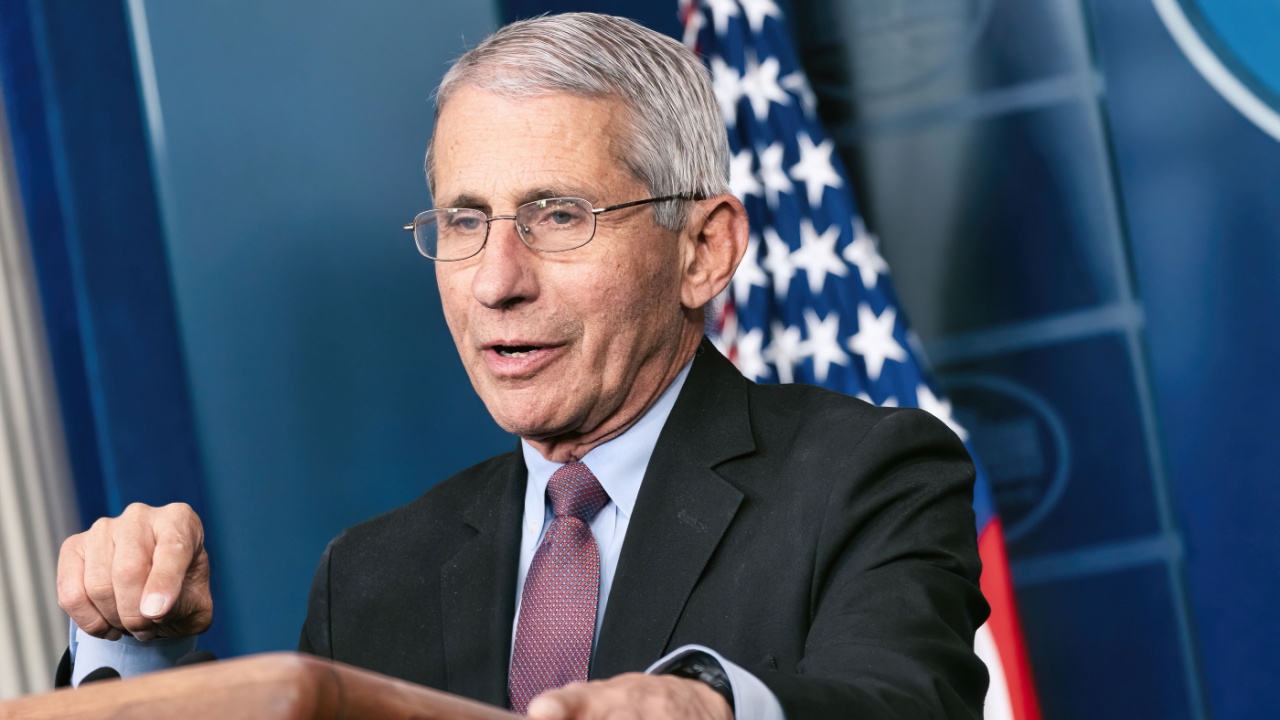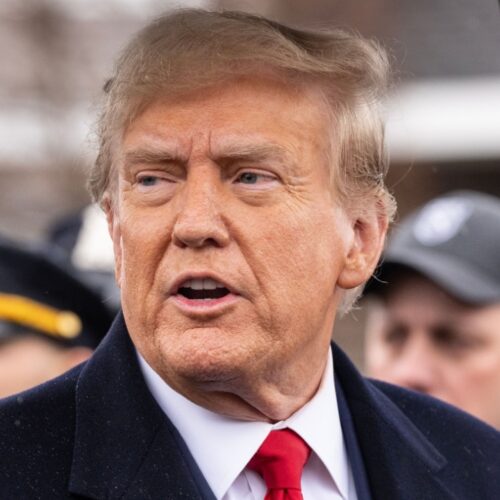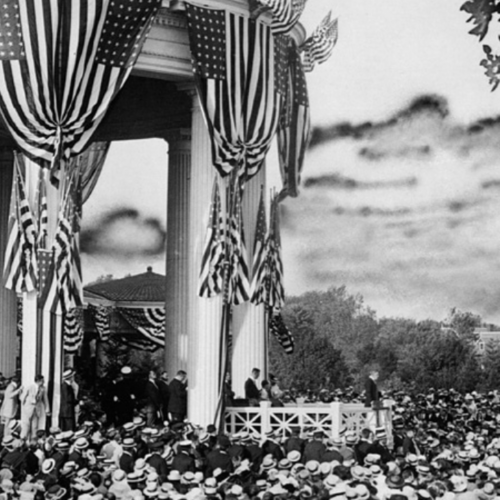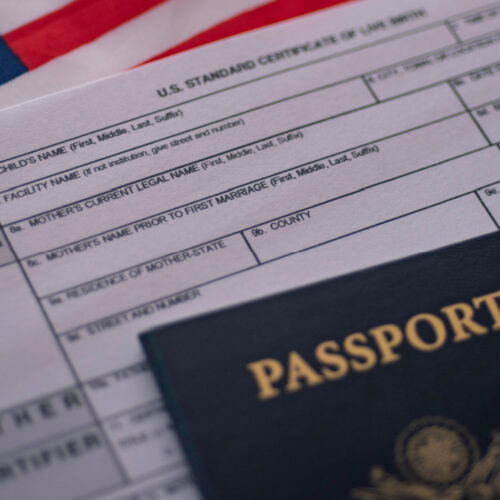Fauci Was Just a Symptom

Editor’s Note: Since the beginning of the Covid-19 pandemic, Anthony Fauci has emerged as a living symbol of federal abuses: lockdowns, mask mandates, and myriad other arbitrary restrictions that unduly burdened the lives of ordinary citizens. Yet there is nothing exceptional about the former NIAID head; he is merely one of countless bureaucrats in Washington who feel entitled to rule their countrymen by the mandate of expertise. Jeffrey H. Anderson reviews RFK Jr.’s recent book on America’s most controversial doctor and concludes that Fauci is not just a bad scientist, but an embodiment of the grave threat posed by a new regime to our Constitution and our way of life.
The mainstream press corps prefers to deal with Robert F. Kennedy Jr. by pretending that he doesn’t exist. This is true both for his presidential campaign—which is thought to pose too much of a threat to President Biden to risk acknowledging it—and for his popular book, The Real Anthony Fauci.
Relegated to Skyhorse Publishing, which Wall Street Journal film critic Kyle Smith describes as “something of a refuge for the cancelled,” Kennedy’s book nevertheless cracked the top 15 on the New York Times hardcover nonfiction best-seller list for 15 consecutive weeks—topping out at #7. Yet apparently it did not merit space in the Times for a review. Wikipedia quickly dismisses The Real Anthony Fauci as a “controversial” book by a “conspiracy theorist” who unjustifiably “attacks” Fauci and “offers disinformation.”
In truth, however, Kennedy’s book is a valuable and generally well-researched indictment of the public health establishment, and more broadly of anti-republican rule by “experts.” While the book’s claims should not be taken as gospel in the way that the credulous press corps hangs on Fauci’s every muddled word, Kennedy shows impressive willingness to stand strong against the current, and his informative and rather countercultural book is very much worth a read. He makes a compelling case that—from AIDS to Covid—Fauci and friends have been pursuing their own agenda at the expense of the American people.
Kennedy chronicles a federal public health establishment that wields nearly monopolistic control over America’s medical research, funding, and messaging. That establishment ensures that university researchers are almost entirely dependent upon federal grants, regularly stifles free inquiry and open debate, effectively “cancels” those who deviate from the establishment orthodoxy, seems uninterested in any sort of care or prevention not involving a pharmaceutical patent, ensures that government public health employees are enriched by pharmaceutical royalties, and—all in all—represents one of the worst examples of the pitfalls of centralized power and control anywhere on our shores.
A book ostensibly about a particular villain in the play, The Real Anthony Fauci ultimately reveals that the problem goes well beyond one especially truth-eschewing, self-serving, camera-hogging bureaucrat. Anthony Fauci was never elected, has essentially never practiced medicine in a clinical setting, is not a health policy expert, and is not even an epidemiologist. Why would anybody have listened to him or cared what he thought during two of the largest-scale public health crises in recent history? The answer is that he was a senior representative of the public health establishment. That goes a long way with a leftist press corps that loves the idea of rule by government, of rule by “experts,” and especially of rule by “government experts.”
To be sure, it matters greatly who leads, and if Fauci’s role had been filled by Scott Atlas or Jay Bhattacharya, the Covid response would have been quite different. Or maybe Covid-19 wouldn’t have existed, as Fauci’s fondness for “gain of function” research raises “the ironic possibility,” as Kennedy writes, “that Dr. Fauci may have played a role in triggering the global contagion that two US presidents entrusted him to manage.”
But high-level bureaucrats are rarely like Atlas or Bhattacharya. People like Fauci rise to power by expertly navigating the bureaucracy, not because they are impressive thinkers or even skilled managers. Moreover, the problems at the Department of Health and Human Services (HHS)—within which reside the Centers for Disease Control and Prevention (CDC), the National Institutes of Health (NIH), and (within NIH) the National Institute of Allergy and Infectious Diseases (NIAID)—extend well beyond just the career staff. The political appointees housed at HHS generally either know nothing and trust the career “experts” or are themselves on loan from Big Pharma, etc. This combination of undesirable personnel is a large part of why HHS is the center of the federal swamp.
Older than Joe Biden, Fauci has been swimming in that swamp for a long time. The year that Fauci was first employed by the federal government, Mickey Mantle was still wearing pinstripes. By his own admission, Fauci joined the Public Health Service to avoid serving in Vietnam.
Raised Roman Catholic but now a self-described “humanist,” Fauci seems to have had a particular knack for talking those with the last name of Bush into doing things he wanted them to do. He managed to get George H. W. Bush to say during a presidential debate that Fauci was “a very fine researcher, top doctor at National Institute of Health, working hard doing something, research on this disease of AIDS.” And he managed to coax George W. Bush into saying in his 2003 State of the Union address, “I ask the Congress to commit $15 billion over the next five years, including nearly $10 billion in new money, to turn the tide against AIDS in the most afflicted nations of Africa and the Caribbean.” This effort, the U.S. President’s Emergency Plan for AIDS Relief (PEPFAR), would become a pillar of Bush’s so-called “compassionate conservatism.”
HHS now brazenly asserts that PEPFAR has saved “over 25 million lives.” The sole basis for this dubious claim seems to be that over 25 million people (counting babies in the womb) have been given antiviral drugs. HHS’s apparent dual assumption is that every one of those people would have died without the drugs, and every one of them has subsequently survived because of the drugs. This is what passes for scientific rigor at HHS.
Kennedy references Fauci’s “libertine approach to facts.” He elaborates, “Tony Fauci does not do public health; he is a businessman, who has used his office to enrich his pharmaceutical partners and expand [his] reach of influence.” Kennedy quotes Dr. Jonathan Fishbein, a former division director at NIAID under Fauci, as saying, “Dealing with Tony Fauci is like dealing with organized crime. He’s like the godfather.” But much like the mafia problem is bigger than any boss, the problem of the swamp is much bigger than Fauci.
The NIH has an annual budget of about $50 billion, enough to give 20,000 separate entities—or an average of 400 per state—$1 million apiece and still have most of that budget left over. One can see how this federal largess can buy influence. Indeed, all 210 drugs that the Food and Drug Administration (FDA) approved from 2010 to 2016 received funding from NIH.
Kennedy is sometimes inclined toward hyperbole, and it can be hard to tell where the healthy skepticism ends and the embrace of conspiracy theories begins. But his book is chock-full of helpful citations, so one can check his claims. His last chapter appears to have been rushed to press without being properly edited and fact-checked. For example, Congress didn’t issue a “declaration of war on Iraq”—we haven’t bothered to follow that essential feature of our Constitution since the Second World War—and it’s not true that Scooter Libby “went to prison” before his “subsequent prison release by President Donald Trump.” In fact, Libby never went to prison and was working down the hall from me at the Hudson Institute at the start of the Trump administration. In general, however, Kennedy seems to be a mostly reliable guide who possesses the important virtue of being willing to question the prevailing orthodoxy in an era of widespread groupthink.
The mainstream press seems incapable of mentioning RFK Jr.’s name without attaching the term “vaccine denier.” He is certainly skeptical of vaccines, and of Bill Gates and his (apparently quite lucrative) vaccine empire. But JFK’s nephew may well have a point that Big Pharma has taken a lot more credit than is justified for Americans’ improved health over the past century or more. The Annual Summary of Vital Statistics: Trends In the Health of Americans During the 20th Century—authored by, among others, the director of the National Center for Health Statistics (NCHS) at HHS and the director of NCHS’s Division of Vital Statistics—says that “nearly 85%” of the extraordinary decline in non-infant child mortality in the U.S. during the 20th century, and “nearly 90%” of the decline in such mortality from infectious diseases, “occurred before 1940, when few antibiotics or vaccines were available.” Kennedy attributes the bulk of this decline to improved sanitation and nutrition.
The public health establishment, as Kennedy observes, could hardly have failed more miserably than it did during Covid. Its ugly authoritarian streak and myopic worldview were both on full display. Public health officials amazingly denied the existence of natural immunity, stubbornly insisted on the efficacy of masks, and blithely suggested that they couldn’t care less whether locking down the economy and shutting kids out of schools caused the ruination of many thousands of businesses, the borrowing of many trillions of dollars, and the impoverishing of many millions of childhoods. Public health officials also wildly asserted, in the words of Biden’s CDC director Rochelle Walensky, that “vaccinated people do not carry the virus” and “don’t get sick”—a claim shown to be pure nonsense.
Yet Covid merely shined a spotlight on a public health establishment whose ineptitude, self-interestedness, insulation, and indifference to genuine scientific inquiry dates back at least 40 years, to the AIDS crisis. Instead of having independent research be conducted by inquisitive, truth-seeking scientists from coast to coast, almost all such research has been funneled through a small cabal of interested individuals who control, shape, and limit that research. Essentially all of the money for such research flows through the federal government, and only those who toe the party line get the government’s—that is, the taxpayers’—money.
Both during AIDS and during Covid-19, Fauci and company fought the use of inexpensive, repurposed drugs to help people’s immune systems fight off the threats. Kennedy argues that they were motivated by a desire to bring pharmaceutical products to market—both antivirals and vaccines—without facing cheap competition, as a portion of Big Pharma’s profits would make their way into the public health officials’ pockets. Indeed, NBC News reports that NIH researchers have personally collected up to $150,000 a year in royalty payments for drugs they have helped develop at taxpayer expense. NBC says that in 2004 NIH researchers pocketed a total of $8.9 million. That’s in addition to their taxpayer-funded salaries. More recently, royalties from Covid vaccines appear to have been quite a boon to NIH, as in 2022 the agency’s overall royalties (not just the portion paid out to employees) skyrocketed to nine times what they were in the pre-Covid year of 2019.
NBC writes, “For instance, two top managers”—Fauci and his deputy—“in NIH’s infectious disease division have received tens of thousands of dollars in royalties for an experimental AIDS treatment they invented.” (In reality, it’s unlikely that either of these two bureaucrats “invented” anything.) “At the same time,” NBC writes, “their office has spent millions in tax dollars to test the treatment on patients across the globe, the records show.” So, those funding, and perhaps ordering, the studies on whether a drug works have a personal financial interest in having those studies come out favorably. This might help explain why, as Kennedy writes, one NIH scientist told Pulitzer-winning New York Times reporter John Crewdson, “It’s hard to be an honest person in this place.”
Take how the public health establishment dealt with hydroxychloroquine, a medicine used for about 70 years for various ailments. Many practicing doctors claimed that—especially when used in combination with zinc and azithromycin—hydroxychloroquine could help keep people from getting Covid-19 and also help treat the disease in its early stages. Kennedy writes that hydroxychloroquine therefore posed “a momentous threat to the pharmaceutical cartel”—somewhat to the Covid-19 vaccine program, and especially to Gilead’s hopes of making a fortune from the antiviral remdesivir, which the federal government spent $162 million by the end of 2020 to help develop, according to the Government Accountability Office. Hydroxychloroquine generally costs less than $1 per tablet, while remdesivir’s price “for a typical treatment course” for those with private health insurance was set, as of mid-2020, at $3,120.
The timeline of events concerning these two drugs is curious and suggests support for Kennedy’s claims:
- On March 24, 2020, in the very early days of Covid-19, radio show host Chris Stigall asked Fauci whether he would prescribe hydroxychloroquine as a treatment for Covid-19 if his patient wanted it. Momentarily transporting himself into a hypothetical world in which he actually saw patients, Fauci replied, “Yeah, of course…it really is an individual choice.”
- On March 28, the FDA issued an Emergency Use Authorization (EUA) for use of hydroxychloroquine, saying that “it is reasonable to believe that…hydroxychloroquine sulfate may be effective in treating COVID-19” and stating that the “potential benefits…outweigh…potential risks.” With remdesivir not yet available, the FDA added, “There is no adequate, approved, and available alternative to…hydroxychloroquine sulfate for the treatment of COVID-19.”
- On April 9, the NIH began clinical trials of hydroxychloroquine, to last 15 months.
- On May 1, the FDA issued an EUA for remdesivir.
- On May 18, President Trump told the press he’d been taking hydroxychloroquine.
- On June 15, the FDA revoked its EUA for hydroxychloroquine, basically saying—with no compelling rationale—that it had changed its mind.
- On June 20, the NIH aborted its clinical trials of hydroxychloroquine, 13 months early.
- On October 22, the FDA approved remdesivir on a non-emergency basis, which Science magazine said “baffled scientists who have closely watched the clinical trials of remdesivir unfold over the past 6 months—and who have many questions about remdesivir’s worth.” Science also noted that a fortnight earlier, in “a deal potentially worth $1 billion,” Gilead had “inked an agreement to supply the European Union.” (Our federal government had already purchased large quantities by that time.)
Cochrane, an independent British organization that provides highly trusted reviews of medical evidence, has subsequently examined the effectiveness of both drugs in treating Covid-19. While Cochrane found no evidence that hydroxychloroquine works on patients who are sick enough to be hospitalized, it said, “We are uncertain whether hydroxychloroquine affected the number of people whose symptoms improved after 28 days,” how many people “developed COVID-19,” or “how many people were admitted to [a] hospital with COVID-19, compared with those receiving a placebo treatment.” This uncertainty is unsurprising, since there have been few randomized controlled trials (RCTs) on hydroxychloroquine, and not all of those have tested the drug as an early treatment, or in combination with zinc and azithromycin.
For remdesivir, Cochrane found that for hospitalized patients, it “probably makes little or no difference to deaths after 28 days…60 days, or…150 days.” As for treatment of patients outside of hospitals, Cochrane writes, “We are uncertain whether remdesivir increases or decreases the chance of symptom alleviation by day 14.” In other words, it could make things better—or worse.
Despite these rather similar reviews, the U.S. public health establishment green-lighted the expensive remdesivir and not only wouldn’t approve the cheap hydroxychloroquine but cancelled the major clinical trial designed to test it and revoked its authorization even on an emergency-use basis. This seemingly fits Kennedy’s description of the “pattern” of Fauci, and other public health officials, “consistently prioritiz[ing] pharmaceutical industry profits over public health.”
Ivermectin appears to have posed an even bigger threat to Big Pharma than hydroxychloroquine did. Cochrane, which describes evidence of ivermectin’s effects on Covid-19 as “conflicting,” notes that there “is a complete gap in the evidence investigating ivermectin for preventing a SARS-CoV-2 infection after high-risk exposure.” Cochrane did report an observed 40 percent reduction in all-cause mortality among patients hospitalized with Covid-19—that is, 40 percent fewer people in the ivermectin group died than in the control group—but it wasn’t statistically significant. Another meta-analysis of RCTs, conducted by U.K. researchers and published in the American Journal of Therapeutics, found almost the same percentage reduction in deaths—38 percent, in this case for patients in all settings—and this finding was statistically significant. That study’s authors conclude, “Moderate-certainty evidence finds that large reductions in COVID-19 deaths are possible using ivermectin.” What’s more, “Using ivermectin early in the clinical course may reduce numbers progressing to severe disease.”
Yet, amazingly, the FDA launched an anti-ivermectin publicity campaign that featured the slogan, “You are not a horse!” The clear implication, lapped up by what Kennedy calls our “brain-dead” and “scientifically illiterate media,” was that this was a veterinary medicine that no one but a barnyard rube would suggest you should take. Never mind that Cochrane says ivermectin “is widely used” (by humans) and “has few unwanted effects,” that it’s on the World Health Organization’s list of “Essential Medicines,” or that the CDC recommends that all Middle Eastern, Asian, North African, Latin American, and Caribbean refugees “should” take it. Despite all of this, an inexpensive medication that apparently offers more promise in treating Covid-19 than the expensive pharma favorite was pilloried by the public health establishment and portrayed as being unfit for our species.
One would think that a free press corps would call out the public health bureaucrats over such ludicrous claims, which could easily have been checked. But as Kennedy observes, “The now-popular term ‘misinformation’ has come to mean any expression that departs from official orthodoxies.” Those who depart must be rebuked or censored by the mainstream press and social media.
It is also interesting to read what Cochrane has to say about the experimental mRNA Covid-19 vaccines. It found that they worked extremely well—in the short run—in preventing people without (known) natural immunity and without weakened immune systems from getting Covid-19. Cochrane says we don’t know whether the vaccines’ effects wane over time—anecdotal evidence now suggests that their benefits greatly diminish—or what effects they might have, for good or ill, on people who have been strengthened by natural immunity or are vulnerable due to weakened immune systems. We also don’t know the vaccines’ effects on pregnant women.
Perhaps most interestingly, Cochrane found no statistically significant evidence that the vaccines reduce all-cause mortality. Instead, Cochrane reports that slight increases in all-cause deaths were observed for both the Pfizer and Moderna vaccines in comparison to the control groups. These slight increases are nowhere near statistically significant, but they certainly don’t point toward the vaccines reducing deaths. Indeed, there appears to be more evidence that ivermectin reduces the chance of death in connection with Covid-19 than there is that the mRNA vaccines do. Yet the federal government spent a fortune on the latter and disingenuously suggested that the former was fit only for four-legged patients.
As Kennedy makes clear, the general playbook for much of the public health establishment’s response to Covid—with the big exception of the lockdowns—traces to the AIDS crisis. Fauci, White House Coronavirus Task Force coordinator Deborah Birx, and Trump’s CDC director Robert Redfield—the troika of mediocrities whom Scott Atlas (an advisor in the Trump White House) says “shared thought processes and views to an uncanny level”—all emerged from the AIDS world. So did Walensky.
Kennedy writes that by 1987, his uncle, Senator Ted Kennedy, “was beginning to suspect that Dr. Fauci was either inept or ‘in the tank’ with Pharma.” The eclectic list of people dissatisfied with the Fauci-led efforts at that point included not only Kennedy but Representative Henry Waxman, Representative Nancy Pelosi, and President Ronald Reagan. But Fauci’s principal life skill is that, in Kennedy’s words, he’s a “master of bureaucratic survival.” He survived that threat, and decades later was still in a position to help steer the country’s response to Covid using the AIDS playbook.
The AIDS experience involved a massive misinformation campaign. Almost from the beginning, the evidence clearly pointed toward AIDS being almost exclusively a disease afflicting homosexual men and intravenous drug users—and especially those who were in both categories. Yet the public health establishment launched a huge propaganda effort to try to convince the citizenry of essentially the opposite—that AIDS was everyone’s disease. From 1987 to 1992, the federal government ran television “public service announcements” a reported 59,000 times as part of the CDC’s “America Responds to AIDS” campaign and its message that “anyone can get HIV/AIDS.” Even before that, in 1983, Fauci had said that it is “important” to note “the possibility that routine close contact, as within a family household, can spread the disease.” This fear-stoking, anti-scientific approach should sound familiar to anyone who watched the public health establishment pretend that schoolchildren were at similar risk from the Wuhan virus as octogenarians.
If the “anyone can get HIV/AIDS” message were true, HIV/AIDS would have broken out into the general population in great numbers. But it was plainly false, as was suggested by a Pulitzer Prize-winning Wall Street Journal article on HIV/AIDS that noted that “for most heterosexuals, the risk from a single act of sex was smaller than the risk of ever getting hit by lighting.” Fast-forwarding about four decades, a publication on the CDC’s own website now estimates (Figure 1) that the number of Americans with HIV peaked in the mid-1980s and has remained at less than half that peak since the early 1990s. In predicting that HIV’s reach would exponentially expand when it actually contracted by more than half, the public health establishment could hardly have been more wrong.
But being wrong has never seemed to hurt Fauci, for whom the onset of AIDS was like striking oil. Kennedy writes that the “critical foundation stone” of Fauci’s career was placed in 1984, when his colleague and ally Robert Gallo claimed to have discovered that HIV causes AIDS. Pioneering the technique that Kennedy calls “science by press release,” Gallo got his boss, Reagan’s HHS Secretary Margaret Heckler, to announce that “the probable cause of AIDS has been found”—proof to follow. Kennedy writes that this claim was crucial to Fauci because it allowed him “to capture the AIDS program and its attendant cash flows from the National Cancer Institute”—where federal AIDS efforts had primarily been housed—“and launch the project of building NIAID into the world’s biggest drug-production empire.”
Peter Duesberg—the first person to isolate a cancer gene and, per the Los Angeles Times, “the first virologist to map the genetic structure of retroviruses”—was utterly unconvinced by Gallo’s claim. Duesberg observes that HIV “was adopted as the cause of AIDS by the U.S. Department of Health and Human Services…even before the first American study on the virus was published.”
While the notion that HIV causes AIDS is now as widely accepted by the general population as the notion that wind propels kites, Kennedy argues that “no one has been able to point to a study that demonstrates their [Gallo and Fauci’s] hypothesis using accepted scientific proofs.” When it comes to the HIV/AIDS orthodoxy—Kennedy would say dogma—Duesberg is the leading skeptic. Duesberg’s theory is basically that the AIDS epidemic in the 1980s was caused by extensive drug use (perhaps particularly of “poppers,” which Kennedy describes as “a mainstay of the gay social scene in the late 1970s”) combined with “multiple acute parasitic infections” and “chronic malnutrition”—of the type resulting from lifestyles that are unhealthy in the extreme—all over the better part of a decade or more.
This hypothesis, if true, would shutter the gold mines full of researchers trying to develop antivirals or (after some 40 years of trying) a vaccine for HIV, as Duesberg’s explanation for the cause of AIDS points toward a largely behavioral, rather than pharmaceutical, solution. As for AIDS in Africa, Duesberg appears to think it’s a sham—that the public health establishment has simply taken a collection of ancient diseases that bear little resemblance to the diseases that define AIDS in the West and renamed them AIDS in Africa. An AIDS patient can board an airplane in Africa, says Duesberg, and somehow no longer have AIDS upon landing in the U.S. or Europe—at least by definition.
As the 1980s gave way to the 1990s, Duesberg thinks “AIDS” (in quotes) was often caused by Fauci and his cohorts telling doctors with HIV-positive patients to prescribe them azidothymidine (AZT), which destroys the immune system so similarly to how actual AIDS does that it’s essentially impossible to distinguish between the two killers. Duesberg calls this “AIDS by AZT.”
Arthur Ashe was a family friend of the Kennedys who had tested positive for HIV antibodies after getting a blood transfusion and was then prescribed what Kennedy calls “an extremely high AZT dose.” In October 1992, Ashe wrote in the Washington Post, “The confusion for AIDS patients like me is that there is a growing school of thought that HIV may not be the sole cause of AIDS, and that standard treatments such as AZT actually make matters worse.” Yet, Ashe wrote, “the medical establishment is too rigid to change the direction of basic research and/or clinical trials.” Four months later, the 1975 Wimbledon champion was dead at 49.
When Cochrane reviewed AZT in 2000, it found that it “is expensive and has several adverse effects including nausea, vomiting, blood problems…and myopathy,” but it “does not increase survival.” Indeed, for those who took AZT, “there was no improvement in survival in the short or long term.”
Rather than debate Duesberg or provide persuasive evidence to debunk him, the public health establishment simply ostracized him. Kennedy writes that both Larry King and Good Morning America scheduled joint appearances with Fauci and Duesberg only to cancel on Duesberg at the last minute and give Fauci the stage to himself (presumably at Fauci’s insistence). He writes that, when Reagan wanted the two to have a “friendly debate” in front of him, the idea was called off because, in the words of a member of the Reagan administration, Fauci “threw a ‘small fit’…and demanded to know why the White House was interfering in scientific matters.” (Imagine the gall of a president wanting an executive branch employee to defend his theory on one of the most pressing issues of the day!)
One of Duesberg’s colleagues at the University of California at Berkeley told longtime AIDS journalist Celia Farber, “Peter may be right about HIV. But there’s an industry now.” Despite trying for years, journalist and gay activist John Lauritsen couldn’t get a single NIH scientist to respond to Duesberg’s article, as NIH officials told him that the etiology of AIDS was off-limits. Lauritsen told Kennedy, “It was the secular version of the doctrine of Papal infallibility; everyone must just accept the ‘AIDS’ virus theory as a matter of fact because the public health pope declares it.”
Kennedy writes that the Covid mask mandates defied the best scientific evidence, “increased social isolation,” and “atomized any sense of solidarity by preventing the most subtle and eloquent nonverbal communication for which God and evolution gave humans forty-two facial muscles.” Fauci himself admitted in recent testimony before Congress that “there was no science behind” the six-foot social distancing rule, one of his most consequential guidelines during the Covid crisis.
Channeling his inner Ron DeSantis, Kennedy writes, “We can bow down and comply—take the jabs, wear the face coverings, show our digital passports on demand, submit to the tests, and salute our minders in the Bio-surveillance State….Or we can say No. We have a choice.” He quotes President Eisenhower’s Farewell Address: “The prospect of domination of the nation’s scholars by Federal employment, project allocations, and the power of money is ever present and is gravely to be regarded.” And on the book’s penultimate page, he wisely reminds us that “we can reassert legislative control,” adding that “it is ordinary people”—in combination with their elected representatives—“who can rescue us from [executive and administrative] tyranny.”
The crux of the problem with our public health establishment is the consolidation and centralization of power and money. Such power and money is often placed in the hands of people like Fauci who are either incredibly incompetent or (as Kennedy thinks) appallingly corrupt. The only genuine solution would seem to be to break up the monopoly. Whether it is public health research or “climate change” research, a tiny group of career federal employees should not be allowed to control the purse strings, agenda, and messaging for a nation of 330 million people. Perhaps the solution, at least in the public health vein, is to split the NIH’s $50 billion annual budget among the states on the basis of population, with no federal strings attached.
Whatever the remedy, however, America needs to free its scientists from adherence to bureaucratic groupthink and once again encourage intellectual inquisitiveness and genuine scientific discovery. Such uncorrupted scientific inquiry is essentially incompatible with having almost all scientific funding be funneled through a small cabal of self-interested bureaucrats. It is this arrangement, coupled with the willingness of elected officials to defer to him, that made Fauci so powerful and permitted him to do so much damage.
As uniquely unscrupulous, power-mongering, and slithering as Fauci is, he is more the symptom than the disease—the effect rather than the cause of an overbearing and largely unchecked administrative state. So long as Congress and executive-branch leaders continue to allow the likes of Fauci to wield unconscionable levels of power on the basis of position rather than merit—in a way that is almost entirely detached from voters—American science, and republican government, will continue to suffer.
Jeffrey H. Anderson is president of the American Main Street Initiative, a think tank for everyday Americans. He served as director of the Bureau of Justice Statistics at the U.S. Department of Justice from 2017 to 2021.



